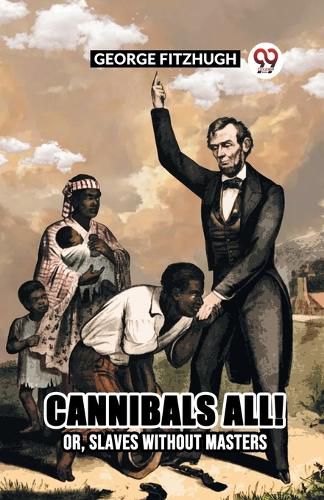Readings Newsletter
Become a Readings Member to make your shopping experience even easier.
Sign in or sign up for free!
You’re not far away from qualifying for FREE standard shipping within Australia
You’ve qualified for FREE standard shipping within Australia
The cart is loading…






This title is printed to order. This book may have been self-published. If so, we cannot guarantee the quality of the content. In the main most books will have gone through the editing process however some may not. We therefore suggest that you be aware of this before ordering this book. If in doubt check either the author or publisher’s details as we are unable to accept any returns unless they are faulty. Please contact us if you have any questions.
"Cannibals All!" penned by George Fitzhugh is a provocative exploration of slavery and its justification inside the antebellum United States. Fitzhugh, a Southern social theorist, affords a controversial protection of slavery via critiquing Northern capitalism and selling the idea that slaves in the South had been higher off than the Northern running class. Fitzhugh challenges prevailing notions of man or woman liberty and free-marketplace capitalism, arguing that the institution of slavery offers a paternalistic shape that ensures the well-being of both slaves and slaveholders. He contends that the intended freedom in the North is a sham, with salary employees facing exploitation and financial insecurity. The title, "Cannibals All!", is metaphorical, suggesting that the North, in Fitzhugh's view, metaphorically consumes its very own citizens via economic exploitation. Fitzhugh's work is outstanding for its excessive positions, as he goes beyond protecting slavery to criticizing the very foundations of capitalist society. While "Cannibals All!" reflects the divisive perspectives of its time, it stands as a historical file, presenting insights into the complicated socio-political panorama of the pre-Civil War era. Fitzhugh's thoughts, though controversial and essentially at odds with cutting-edge moral requirements, offer a lens thru which to look at the highbrow underpinnings of seasoned-slavery arguments in the 19th century.
$9.00 standard shipping within Australia
FREE standard shipping within Australia for orders over $100.00
Express & International shipping calculated at checkout
This title is printed to order. This book may have been self-published. If so, we cannot guarantee the quality of the content. In the main most books will have gone through the editing process however some may not. We therefore suggest that you be aware of this before ordering this book. If in doubt check either the author or publisher’s details as we are unable to accept any returns unless they are faulty. Please contact us if you have any questions.
"Cannibals All!" penned by George Fitzhugh is a provocative exploration of slavery and its justification inside the antebellum United States. Fitzhugh, a Southern social theorist, affords a controversial protection of slavery via critiquing Northern capitalism and selling the idea that slaves in the South had been higher off than the Northern running class. Fitzhugh challenges prevailing notions of man or woman liberty and free-marketplace capitalism, arguing that the institution of slavery offers a paternalistic shape that ensures the well-being of both slaves and slaveholders. He contends that the intended freedom in the North is a sham, with salary employees facing exploitation and financial insecurity. The title, "Cannibals All!", is metaphorical, suggesting that the North, in Fitzhugh's view, metaphorically consumes its very own citizens via economic exploitation. Fitzhugh's work is outstanding for its excessive positions, as he goes beyond protecting slavery to criticizing the very foundations of capitalist society. While "Cannibals All!" reflects the divisive perspectives of its time, it stands as a historical file, presenting insights into the complicated socio-political panorama of the pre-Civil War era. Fitzhugh's thoughts, though controversial and essentially at odds with cutting-edge moral requirements, offer a lens thru which to look at the highbrow underpinnings of seasoned-slavery arguments in the 19th century.